#EnterpriseResourcePlan
Explore tagged Tumblr posts
Text
ERP Implementation Solutions | Parkar Accounting – Streamline Your Business Operations
Optimize your business processes with ERP implementation solutions from Parkar Accounting. Our expert team ensures seamless integration, improved efficiency, and data-driven decision-making with customized Enterprise Resource Planning (ERP) solutions. From financial management to inventory control, we help businesses streamline operations, enhance productivity, and achieve scalability. Whether you're upgrading an existing system or implementing ERP from scratch, we provide end-to-end support tailored to your needs.
0 notes
Text
What is SAP Used For? A Beginner’s Guide to Understanding SAP
"What is SAP Used For? A Beginner’s Guide to Understanding SAP" provides an overview of SAP (Systems, Applications, and Products in Data Processing), a leading enterprise resource planning (ERP) software. SAP helps businesses manage operations, financials, supply chains, and customer relationships. It integrates various business functions, streamlining processes and improving efficiency. This guide simplifies SAP’s key features for beginners.
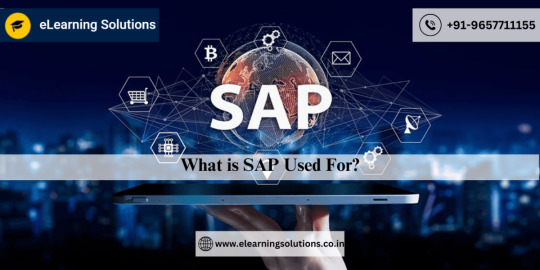
#WhatIsSAP#SAPGuide#EnterpriseResourcePlanning#SAPSoftware#BusinessManagement#ERPSystems#TechForBusiness#SAPBeginner
0 notes
Text
Powering the Future: How ERP Transforms Solar Manufacturing
The world is shifting toward renewable energy, and solar power is leading the charge. The demand for solar panels has risen, and manufacturers are challenged in the areas of supply chain organization, production efficiency, and regulatory compliance. That is where an Enterprise Resource Planning (ERP) system comes in; it is a game changer in the whole solar manufacturing paradigm for streamlining operations and driving growth.
Need for ERP for Solar Manufacturers
Manufacturing solar panels is not just about putting the photovoltaic cells together, it is about procurement of good raw material, imagining intricate production processes; quality control in itself is very involved, and compliance with ever-constant changes in regulations.
Without an integrated system, solar panel manufacturers often carry out their business through multiple spreadsheets, unconnected software solutions, and manual processes, which creates inefficiencies, delays, and costly mistakes. An ERP will bring everything together and provide real-time visibility into operations, automating many activities and facilitating data-based decision-making.
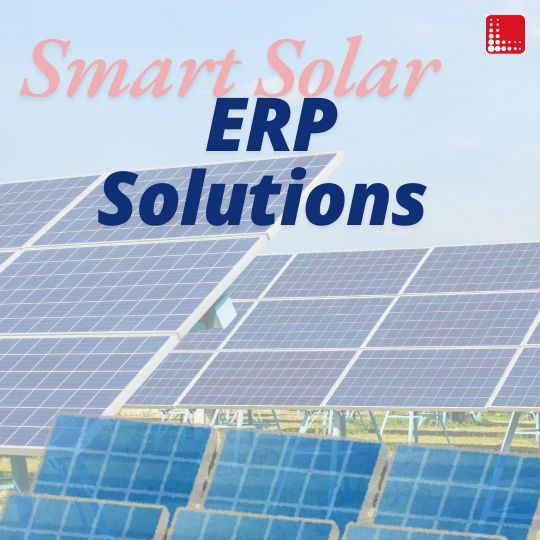
Core Aspects of an ERP Solution for Solar Manufacturing
🌞 Supply Chain & Inventory Management Solar manufacturing relies on sourcing raw materials such as silicon, glass, and metals that need to be effectively handled throughout purchasing, storage, and production processes. The ERP system provides: ✔️ Real-time inventory control to avoid stockout or excessive stock holding. ✔️ Supplier management for timely delivery and assurance of quality. ✔️ Automated procurement to ensure all for material purchases.
⚙️ Production Planning & Process Automation Each step, from wafer production to panel assembly, needs to be precise. The ERP system: ✔️ Automating production schedules to reduce downtime and optimize the use of resources. ✔️ Machine performance monitoring to prevent breakdown. ✔️ Less waste by better utilization of materials.
✅ Quality Control & Compliance
Solar panels are subjected to detailed quality and environmental standards. ERP ensures: ✔️ Identification of defects and recalls with full reverse traceability. ✔️ Automated compliance reporting with international standards. ✔️ Batch tracking for manufacturing consistency in quality.
💰 Financial & Cost Management Profitability in a competitive market is prime. ERP gives: ✔️ Immediate cost analysis in order to control production costs. ✔️ Automated invoicing & payroll, facilitating smooth financial processes.
📊 Real-time Data & Business Intelligence
ERP turns data into insights, helping businesses grow. With: ✔️ Custom dashboards for tracking key performance indicators (KPIs). ✔️ Predictive analytics to anticipate market trends. ✔️ Cloud accessibility for managing operations from anywhere.
How can an ERP help solar manufacturers?
✅ It increases efficiency by automating tasks and limiting human errors. ✅ It supports scalability for businesses growing; therefore, scalability remains a foundation for all business processes, leading to quick action concerning market expansion. ✅ Increased customer satisfaction through quicker delivery and good quality. ✅ Improved profitability, fine-tuning of cost-control, and resource management.
Selecting an ERP solution for use in Solar Manufacturing
ERP cannot be rated equally as all ERP solutions available will vary in technological application, flexibility, and scalability. 🌟 Industry-specific functionalities specifically tailored to Solar processing. 🌟 Cloud platform access and real-time updates that capture user interactions. 🌟 Capable of integration to make the best of CRM, IoT( (if in use). 🌟 Should be scalable for future expansion and market evolution.
Final Thoughts
The future of solar manufacturing is very exciting, but for this industry to remain competitive, it has to be much more than just about new energy sources with innovative solutions. One of these is the solar manufacturing business that will continue to distinguish itself in the future from the rest. Sun grow said that a convenient ERP is not just a magic wand; it is the basis for the continued growth of a solar market business.
#SolarManufacturing#ERPSoftware#RenewableEnergy#SmartManufacturing#SupplyChainManagement#ProcessAutomation#SolarIndustry#GreenEnergy#QualityControl#SustainableManufacturing#EnterpriseResourcePlanning#SolarTechnology#ManufacturingERP#FinancialManagement#BusinessAutomation#CleanEnergy
0 notes
Text
Streamlining Solar Panel Manufacturing with ERP
As the demand for solar energy grows, solar panel manufacturers face complex challenges in production, inventory, and supply chain management. Enterprise Resource Planning (ERP) systems help streamline these processes, reduce costs, and improve efficiency. This blog explores how ERP can optimize operations and boost competitiveness in the solar panel manufacturing industry.
What is ERP?
Enterprise Resource Planning (ERP) is a kind of software system, integrating core business processes of an organization across the department. ERP streamlines workflows, automates tasks, manages resources, and provides real-time data across areas of production, finance, inventory, sales, and customer service. By centralizing all the data and operations in one system, it helps organizations make better decisions and remain operationally effective.
Why ERP for Solar Panel Manufacturing?
Manufacturing solar panels is a process involving a number of coordinated activities: from raw material sourcing and procurement to production and distribution. Multiple benefits of an ERP system directly relate to the problems that a solar panel manufacturer is likely to face:
Optimized Supply Chain Management ERP systems enable solar panel manufacturers to have a seamless supply chain. With the right ERP solution, businesses can monitor supplier performance, track raw materials, and ensure timely deliveries. This prevents production delays due to material shortages and improves overall supply chain efficiency.
Efficient Production Planning and Scheduling In a manufacturing environment, efficient production planning is of utmost importance. ERP automates production schedules, effectively allocates resources, and minimizes downtime. Real-time visibility into production workflows gives manufacturers the information they need to make informed decisions and avoid bottlenecks that could delay deliveries.
Inventory Management and Control Inventory management is a very critical function for solar panel manufacturers. Excess inventory ties up capital, and less stock will result in delayed production. An ERP system can track the real-time level of inventory, manage reorder points, and reduce waste. It ensures that manufacturers have the right materials on hand when they need them, while also minimizing the risk of stockouts or overstocking.
Quality Control and Compliance Solar panels are required to adhere to strict quality standards, and manufacturers must maintain consistent product quality. ERP solutions can integrate quality control checks at all stages of production to ensure products meet industry standards. Moreover, ERP systems ensure that manufacturers adhere to regulations and certifications, such as ISO standards or environmental requirements.
Financial Management ERP manages the financial operations like accounting, invoicing, and budgeting. Integration of financial data with other business functions provides a clear picture of the financial health of the solar panel manufacturers. This enables better financial forecasting, cost control, and profitability analysis.
Real-Time Data and Reporting ERP systems give the user real-time data on key performance indicators like production output, supply chain performance, and financials. Having the right and updated information right at your fingertips enables decision-makers to make the right and informed decisions that increase the overall efficiency of the operation.
Customer Relationship Management (CRM) The CRM modules that come with ERP solutions help manufacturers to manage customer relationships. Manufacturers can monitor customer orders, manage sales processes, and deliver better customer services. This will create stronger customer satisfaction and loyalty in an increasingly competitive market.
How ERP Benefits Solar Panel Manufacturers:
Improved Efficiency: Automation of repetitive tasks such as inventory tracking, order processing, and invoicing increases operational efficiency, reducing the time and labor required for these tasks. It reduces waste, optimizes production schedules, and avoids stockouts, thereby directly reducing the costs and better resource utilization. Better Decision-Making: Manufacturers can make better decisions in processes and profitability from real-time data and its advanced reporting features. Scalability: As the solar panel manufacturing business scales up, the ERP system will scale up too with more production lines, new products, or even locations without interfering with operations. Increased Inter-Departmental Coordination: With all departments on the same integrated system, coordination between teams improves, and responses are faster. ERP Features Important to Solar Panel Manufacturers
Material Requirement Planning (MRP): Helps in determining material requirements for production and prevents stock shortages. Production Scheduling: Automatically schedules and optimizes production based on resources available. Supply Chain Management: Tracks supplier relationships, raw material procurement, and logistics. Product Life Cycle Management: Traces and tracks the solar panel's product life cycle, starting from design to disposal. Sustainability Reporting: It can be used by manufacturers to track energy consumption, emissions, and waste production to ensure environmental compliance.
#SolarPanelManufacturing#ERP#RenewableEnergy#ManufacturingEfficiency#SupplyChainManagement#InventoryManagement#ProductionOptimization#EnergyIndustry#SmartManufacturing#EnterpriseResourcePlanning#SustainableManufacturing#SolarEnergy
0 notes
Text
Why Manufacturing Industries Need ERP Systems for Material and Production Planning?
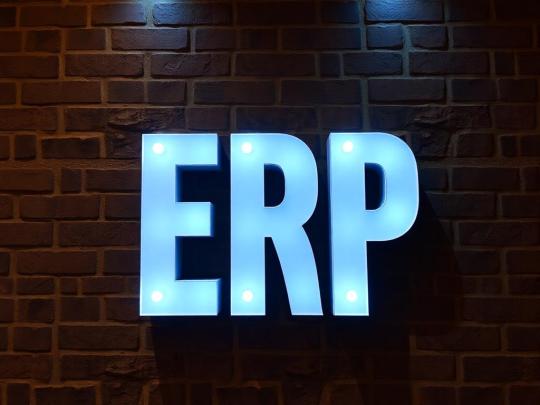
Enhancing Material and Production Planning with ERP Systems in Manufacturing
Manufacturing industries operate in a dynamic environment where efficiency and precision are paramount. To meet these demands, adopting a robust manufacturing ERP system is crucial for effective material and production planning.
An ERP system for manufacturing industry provides an integrated solution that connects all aspects of the business, from procurement and inventory management to production and distribution. This comprehensive approach ensures seamless operations and improved decision-making. Tools like ERPNext manufacturing are tailored to address the unique challenges of production-based industries, making them a top choice for manufacturers.
Manufacturing enterprise resource planning systems play a vital role in resource allocation, scheduling, and real-time tracking. By utilizing industrial ERP solutions, manufacturers gain visibility into their operations, enabling them to forecast demand accurately and avoid bottlenecks. These systems are particularly beneficial for optimizing supply chains and reducing material wastage.
Small businesses can also leverage the power of manufacturing software for small business to compete with larger players. Solutions such as business manufacturing software and manufacturing ERP software are designed to streamline operations and enhance productivity for small-scale manufacturers. The implementation of manufacturing enterprise resource planning software allows these businesses to automate routine tasks, manage resources effectively, and maintain high-quality production standards.
With a dedicated manufacturing resource planning system, manufacturers can ensure that raw materials are always available when needed, preventing costly production delays. The integration of production ERP software allows businesses to track each stage of the production process, ensuring timely delivery and quality assurance. These tools are essential for meeting customer expectations and staying ahead in the market.
Implementing ERP software for manufacturing industry also fosters compliance with industry regulations and minimizes operational risks. Whether for large enterprises or smaller ventures, a robust ERP software manufacturing industry solution provides the scalability and flexibility needed to adapt to changing market demands.
#ManufacturingERP#ERPSystem#ProductionPlanning#ERPNextManufacturing#IndustrialERP#ManufacturingSoftware#ERPForManufacturing#BusinessManufacturingSoftware#EnterpriseResourcePlanning#MaterialPlanning#SmallBusinessSolutions#ManufacturingEfficiency#ERPImplementation#SmartManufacturing#DigitalTransformation
0 notes
Text

🚀 Unlock Your Career Potential with MENTOR TECHSYSTEMS! 🌟
Join our SAP SD (Sales & Distribution) course and learn from industry experts! 💼✨
Why choose SAP SD?
✓ Master sales, billing, and logistics.
✓ Gain insights from real-world professionals.
✓ Open doors to top-paying jobs in the SAP domain! 💰
📅 Get a FREE demo session today!
👉 Register Now: www.mentortechsystems.com
📞 For more info: +91 8282824781 / +91 8282826381
#SAP#CareerGrowth#MentorTechSystems#FreeDemo#SAPSD#SAPSalesAndDistribution#SupplyChainManagement#ERP#EnterpriseResourcePlanning#BusinessProcess#SoftwareSolutions#DigitalTransformation#Logistics#SalesManagement#CustomerService#DataIntegration#AutomatedProcesses#BusinessAnalytics
0 notes
Text
#ERPSoftware#BusinessSolutions#EnterpriseResourcePlanning#ERPSystem#ERPImplementation#CloudERP#ERPSolutions#BusinessManagement#EnterpriseSolutions#ERPForIndianBusinesses#ERPHyderabad
1 note
·
View note
Text
What is enterprise resource planning (ERP)?

What is ERP?
Enterprise Resource Planning (ERP) is a comprehensive software solution designed to streamline and automate a company’s core business processes, from financial management to supply chain operations. At Xaltam Technologies, we help businesses implement ERP systems that simplify complex workflows, improve efficiency, and provide real-time insights into operations.
How does ERP work?
ERP systems integrate multiple business functions into a single unified platform. By linking modules such as finance, human resources, manufacturing, and customer relationship management (CRM), companies can manage day-to-day activities from a central location. This interconnectedness reduces data silos and boosts operational efficiency, making ERP systems indispensable to businesses seeking growth and scalability.
At Xaltam Technologies, we specialize in ERP implementation tailored to your business needs. Whether you're looking for cloud-based ERP, on-premises solutions, or hybrid models, our team ensures a seamless transition. Learn more about our ERP services here.
Types of ERP Software
ERP solutions come in three primary forms:
Cloud ERP (SaaS): Ideal for companies looking for scalability and flexibility, cloud ERP enables access from anywhere with an internet connection. It's cost-effective and requires no in-house IT infrastructure.
On-premises ERP: For organizations that want full control over their data and security, on-premises ERP is deployed and managed locally.
Hybrid ERP: A blend of both cloud and on-premises, hybrid ERP allows companies to keep sensitive data on-site while taking advantage of cloud features.
At Xaltam Technologies, we assess your business needs and help you choose the right ERP deployment model for your growth strategy.
Key ERP Modules
ERP software consists of various modules that can be customized based on business requirements. Some key ERP modules include:
Finance & Accounting: Automate accounts payable/receivable, manage cash flow, and generate detailed financial reports.
Procurement: Streamline the purchasing process, manage vendor relationships, and monitor stock levels.
Manufacturing: Plan and oversee production schedules, track goods in progress, and manage material requirements.
Sales & CRM: Enhance customer engagement by providing data-driven insights and streamlined communication across all channels.
Human Resources: Manage payroll, employee data, performance reviews, and workforce analytics.
Why Choose Xaltam Technologies for ERP Implementation?
By choosing Xaltam Technologies for ERP implementation, you're selecting a partner that understands your business challenges and offers solutions to optimize productivity and reduce operational costs. We provide end-to-end ERP services, from system selection to installation, data migration, and ongoing support.
Our ERP solutions not only streamline your operations but also help you harness data to make informed decisions and drive growth.
Benefits of ERP Systems
ERP systems offer numerous advantages:
Enhanced Productivity: Automate repetitive tasks and reduce manual entry.
Reduced Operational Costs: By integrating core functions, businesses can reduce operational inefficiencies.
Scalability & Flexibility: Our ERP solutions are designed to grow with your business, offering scalability for future expansion.
Real-time Insights: Access critical data anytime, enabling quick and informed decision-making.
ERP Use Cases
ERP systems are used across various industries, including:
Utilities: Manage capital assets and forecast future demand efficiently.
Service Companies: Ensure seamless project delivery and real-time data accessibility.
Wholesalers: Optimize inventory management, purchasing, and logistics with ERP solutions.
Retailers: Improve customer engagement and manage online and offline operations with integrated data.
At Xaltam Technologies, our ERP solutions are customized to meet the specific needs of your industry. Let us help you transform your operations with the right ERP system.
#ERPSystems#EnterpriseResourcePlanning#ERPSolutions#BusinessAutomation#CloudERP#OnPremiseERP#HybridERP#ERPIntegration#BusinessEfficiency#ERPImplementation#RealTimeData#XaltamTechnologies#DigitalTransformation#ERPSoftware#BusinessGrowth#ScalableSolutions#ProcessOptimization#DataDriven#ERPModules#BusinessIntelligence
1 note
·
View note
Text

How to Create an Effective Enterprise Business Application: Essential Guide
Creating an effective enterprise business application requires a strategic approach that aligns with the organization’s objectives, user needs, and technological advancements. Here’s an essential guide to help you design and develop a robust enterprise application.
1. Understand Business Requirements and Goals
Identify Objectives: Begin by understanding the core objectives the application must fulfil. This includes streamlining workflows, improving communication, enhancing productivity, or increasing customer satisfaction.
Stakeholder Involvement: Engage with key stakeholders — executives, department heads, and end-users — to gather their input. This ensures the app meets the diverse needs of the enterprise.
Define Use Cases: Identify specific use cases that demonstrate how different users interact with the application. These could involve processing orders, managing customer data, or handling internal communication.
2. Choose the Right Technology Stack
Backend Technologies: The choice of backend technology (e.g., Java, .NET, Python) should offer scalability, security, and the ability to integrate with existing enterprise systems like CRM, ERP, or legacy databases.
Frontend Technologies: Ensure that the frontend technology (e.g., React, Angular, or Vue.js) offers a responsive, intuitive user interface that simplifies complex workflows.
Cloud or On-Premise: Decide whether the application will be hosted on the cloud (AWS, Azure) or on-premise, considering factors like security, cost, and scalability.
CodeRower, with its expertise in enterprise app development, can assist you at every stage of this journey — from defining the requirements to delivering scalable, secure, and high-performance enterprise solutions. Our team is dedicated to helping you build applications that drive efficiency and success within your organization.
3. Prioritize User-Centered Design (UCD)
UI/UX Design: Focus on user experience by developing intuitive interfaces that are easy to navigate. Leverage design systems and consistency to minimize training requirements.
User Roles and Permissions: Enterprise applications often require role-based access control (RBAC) to manage what different users can view or modify. Define clear roles such as admin, manager, or regular employee.
Mobile Responsiveness: With the rise of mobile devices, ensure the application is mobile-responsive, or consider building a dedicated mobile app to enhance accessibility for remote teams.
4. Implement Robust Security Measures
Data Encryption: Protect sensitive business data with end-to-end encryption in transit and at rest.
Access Control: Implement multi-factor authentication (MFA) and RBAC to ensure secure access for users at different levels of the organization.
Compliance: Ensure the application complies with relevant industry regulations such as GDPR, HIPAA, or ISO standards, especially for sensitive data like financial or healthcare information.
5. Focus on Integration Capabilities
API Integration: Modern enterprise applications must seamlessly integrate with other systems like CRM, ERP, or accounting software. Build RESTful APIs that allow for easy data exchange across platforms.
Legacy System Integration: Many enterprises rely on legacy systems. Ensure the new application can integrate with older databases and systems without disrupting operations.
Third-Party Services: Identify essential third-party services (e.g., payment gateways, customer support tools) that must be integrated for a smoother workflow.
6. Ensure Scalability and Performance
Modular Architecture: Build the application with a modular architecture to allow for easy updates, scaling, or feature additions without disrupting existing functions.
Load Balancing: As the user base grows, implement load balancing to distribute traffic evenly across servers and maintain high performance.
Cloud Scalability: For cloud-based applications, leverage auto-scaling features to handle periods of high traffic and avoid bottlenecks.
7. Plan for Continuous Maintenance and Updates
Agile Development: Adopt agile methodologies to allow for iterative development and continuous feedback from users. This makes it easier to roll out new features and improve existing ones.
Bug Fixes and Patches: Create a schedule for regular bug fixes, patches, and updates. Stay proactive in identifying issues before they affect the entire user base.
User Support and Documentation: Offer extensive documentation, FAQs, and a support system to help users navigate the application effectively.
8. Test Rigorously Before Launch
Unit and Integration Testing: Conduct unit tests to verify that individual components function correctly and integration tests to ensure smooth interaction between modules.
Load Testing: Simulate heavy traffic scenarios to test the performance of the application under peak conditions.
User Acceptance Testing (UAT): Engage end-users in the testing process to identify pain points or bugs they may encounter during regular use.
9. Monitor and Optimize Post-Launch
Performance Monitoring: Use tools to monitor the app’s performance in real-time and catch any potential issues like slow loading times or memory leaks.
User Feedback Loop: Continuously gather user feedback to improve features, usability, and overall satisfaction.
Data Analytics: Implement analytics to track user behavior and business KPIs. These insights help in making informed decisions for future updates.
10. Train Employees and Promote Adoption
Training Sessions: Conduct training sessions to ensure all users are comfortable with the new application.
Promote Internal Adoption: Encourage company-wide adoption through internal marketing, clear communication, and highlighting the app’s benefits to different departments.
Conclusion
Creating an effective enterprise business application requires careful planning, user-centered design, security, scalability, and a focus on continuous improvement. By following these guidelines, you can deliver an application that not only addresses the current needs of the business but also evolves with future requirements.
Unlock the full potential of your enterprise with CodeRower’s expert app development services. Whether you’re looking to create a robust business application from scratch or enhance your existing systems, our skilled team is here to guide you every step of the way.
Contact us today for a free consultation, and let’s discuss how we can help you achieve your business objectives with a tailored enterprise solution!
#enterprise software development#software development#app development#web app development#web development#android app development#ios app development#custom app development#custom software development#game development#enterprise software#enterpriseresourceplanning
0 notes
Text
What is the difference between ERP and MRP?

ERP (Enterprise Resource Planning) integrates all business processes into one system, while MRP (Material Requirements Planning) focuses on inventory and production planning.
Read on https://www.cypruserp.com/what-is-the-difference-between-erp-and-mrp/
0 notes
Text
How to Define Plant in SAP
This instructional exercise guides you on the most proficient method to make/Characterize a Plant in SAP bit by bit.
Steps to Define Plant in SAP:
IMG Menu Path:-
SPRO > SAP Customizing Implementation Guide (IMG) > Enterprise Structure > Definition > Logistics – General > Define copy, delete, check plant
Transaction Code to Define Plant:- OX10. read more
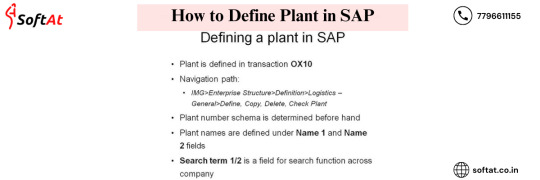
0 notes
Text

Transform your business with IPIX ERP! Our cutting-edge Enterprise Resource Planning system centralizes all your data, enhances collaboration, and automates key processes. From inventory management to finance, IPIX ERP streamlines every aspect of your operations, allowing you to focus on growth and innovation. Experience seamless integration and real-time insights tailored to your needs. Elevate your business with IPIX Technologies!
0 notes
Text
How Udyog ERP Software Boosts Productivity in the Manufacturing Industry: India’s Premier ERP Solution
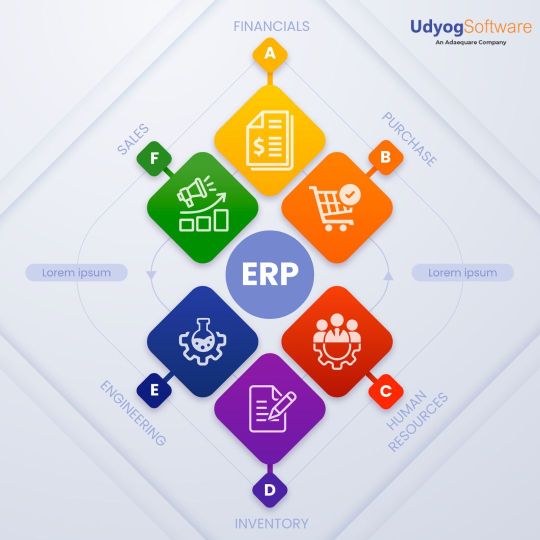
In the dynamic world of manufacturing, where efficiency and precision are paramount, having a robust ERP (Enterprise Resource Planning) system can make a significant difference. Udyog ERP software for manufacturing Industry has emerged as a game-changer for the Indian manufacturing industry, offering a suite of tools designed to enhance productivity, streamline operations, and drive growth. Here’s how Udyog ERP Software is transforming the manufacturing sector and solidifying its position as India’s premier ERP solution.
Manufacturing ERP Solutions
Udyog ERP software for manufacturing Industry Software is a leading solution tailored specifically for the manufacturing industry, offering a comprehensive suite of features designed to streamline operations and boost productivity. By integrating key functions such as production planning, inventory management, supply chain oversight, and quality control into a single platform, Udyog ERP enables manufacturers to achieve greater efficiency and precision. Its real-time data analytics and customizable features ensure that businesses can adapt to changing needs and make informed decisions, solidifying Udyog ERP as a premier choice for manufacturing ERP solutions.
Cloud ERP for Manufacturing
Udyog ERP Software, optimized for the manufacturing industry, offers a powerful Cloud ERP solution designed to enhance efficiency and scalability. By leveraging cloud technology, Udyog ERP software for manufacturing Industry provides manufacturers with real-time access to critical data, streamlined integration across various departments, and advanced features for inventory management, production planning, and quality control. This cloud-based approach ensures that manufacturers can manage their operations seamlessly from anywhere, adapt to changing business needs swiftly, and drive productivity with greater agility.
Enterprise Asset Management
Udyog ERP Software enhances Enterprise Asset Management (EAM) for the manufacturing industry by offering a comprehensive suite of tools designed to optimize asset utilization and lifecycle management. With Udyog ERP software for manufacturing Industry, manufacturers can track and manage their assets from acquisition through to retirement, ensuring efficient maintenance, minimizing downtime, and extending asset life. The software integrates real-time data on asset performance, automates maintenance schedules, and provides detailed analytics, enabling manufacturers to make informed decisions, reduce operational costs, and enhance overall productivity. Udyog ERP’s robust EAM capabilities ensure that every asset is fully utilized and contributes effectively to the company’s operational goals.
Manufacturing Process Automation
Udyog ERP Software revolutionizes manufacturing process automation by providing a comprehensive platform that integrates every stage of the production cycle. From automated production planning and scheduling to real-time inventory management and quality control, Udyog ERP streamlines operations and enhances efficiency. By automating routine tasks and offering real-time insights, the software minimizes manual intervention, reduces errors, and accelerates decision-making. This leads to a more agile and responsive manufacturing process, enabling companies to meet market demands swiftly and effectively while optimizing resource utilization and maintaining high-quality standards.
Work Order Management Software
Udyog ERP software for manufacturing Industry Software excels in Work Order Management, offering a robust solution tailored for the manufacturing industry. This feature streamlines the entire work order process, from creation and scheduling to execution and tracking. By integrating work order management with inventory, production, and procurement modules, Udyog ERP ensures seamless coordination and real-time visibility. Manufacturers can efficiently allocate resources, monitor progress, and manage job priorities, ultimately enhancing productivity, reducing lead times, and ensuring timely delivery of products. With Udyog ERP, manufacturers gain a powerful tool to optimize work order management and drive operational excellence.
Don’t let inefficiencies and disjointed systems hold your manufacturing business back. Embrace the future of manufacturing with Udyog ERP software for manufacturing Industry. Schedule a demo today to see how Udyog ERP can transform your operations and boost productivity. Experience firsthand how India’s premier ERP solution can help you achieve greater efficiency, streamline processes, and drive your business forward.
Visit our website or contact us to learn more about how Udyog ERP software for manufacturing Industry can revolutionize your manufacturing operations and put you on the path to success.
#ERPForSMEs#ERPSoftwareIndia#BestERPIndia#IndiaERP#TopERPSolutions#ERPSystemsIndia#BusinessSoftwareIndia#EnterpriseResourcePlanning
0 notes
Text
Transform Your Financial Planning with ACCNU ERP
In the rapidly changing landscape of modern business, accurate financial planning and budgeting are essential for sustained success. Traditional methods often struggle to keep pace, leading to inefficiencies and inaccuracies that can hinder growth. ACCNU ERP offers a revolutionary solution, integrating all your financial functions into a single, seamless system. With features like comprehensive financial management, automated budgeting and forecasting, advanced reporting and analytics, compliance and risk management, and scalability, ACCNU ERP empowers your business to align financial plans with strategic goals. Implementing ACCNU ERP involves a thorough assessment of your needs, strategic project planning, stakeholder engagement, data migration, team training, and continuous improvement. Elevate your financial planning and position your business for long-term success with ACCNU ERP.
Ready to revolutionize your financial planning with ACCNU ERP? Our team is here to guide you every step of the way. Whether you have questions, need more information, or want to schedule a personalized demo, we’re just a call or click away. phone no:+91 90004 82706 +91 9573737308 Email:[email protected] Website: https://accnu.in/
#accnu#accnuERP#ERP#ERPPartner#ERPProvider#ERPSolutions#ERPSystem#EnterpriseResourcePlanning#financialPlanning#budgeting#FinancialPlanning#financial management#automatedbudgeting#forecasting#Advancedreporting#analytics#riskmanagement#scalability#DigitalTransformation#erpservices
0 notes
Text

No worries! Let us do the hard work for you!
Eazy ERP helps you align all the operational data in a strategic manner so you don't have to sit day and night organising it.
For More Info, Click Here: https://www.eazyerp.com
0 notes
Text
Revolutionize your workflow: State-of-the-art ERP software
In today’s fast-paced business environment, staying ahead often means using technology to streamline processes and increase efficiency. Enter ERP software – a game-changing tool that can transform your business operations. But not just any ERP software: we’re talking about cutting-edge solutions provided by industry leaders like Bharat ERP. In this blog, we dive into how state-of-the-art ERP…

View On WordPress
#BusinessAutomation#DigitalTransformation#EnterpriseResourcePlanning#ERPIntegration#ERPSoftware#ERPSystems
0 notes